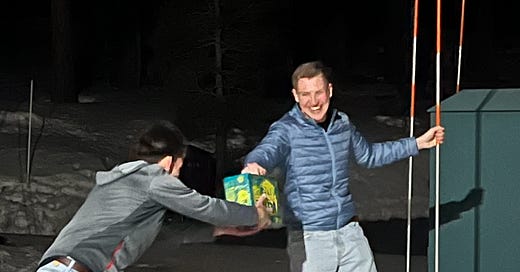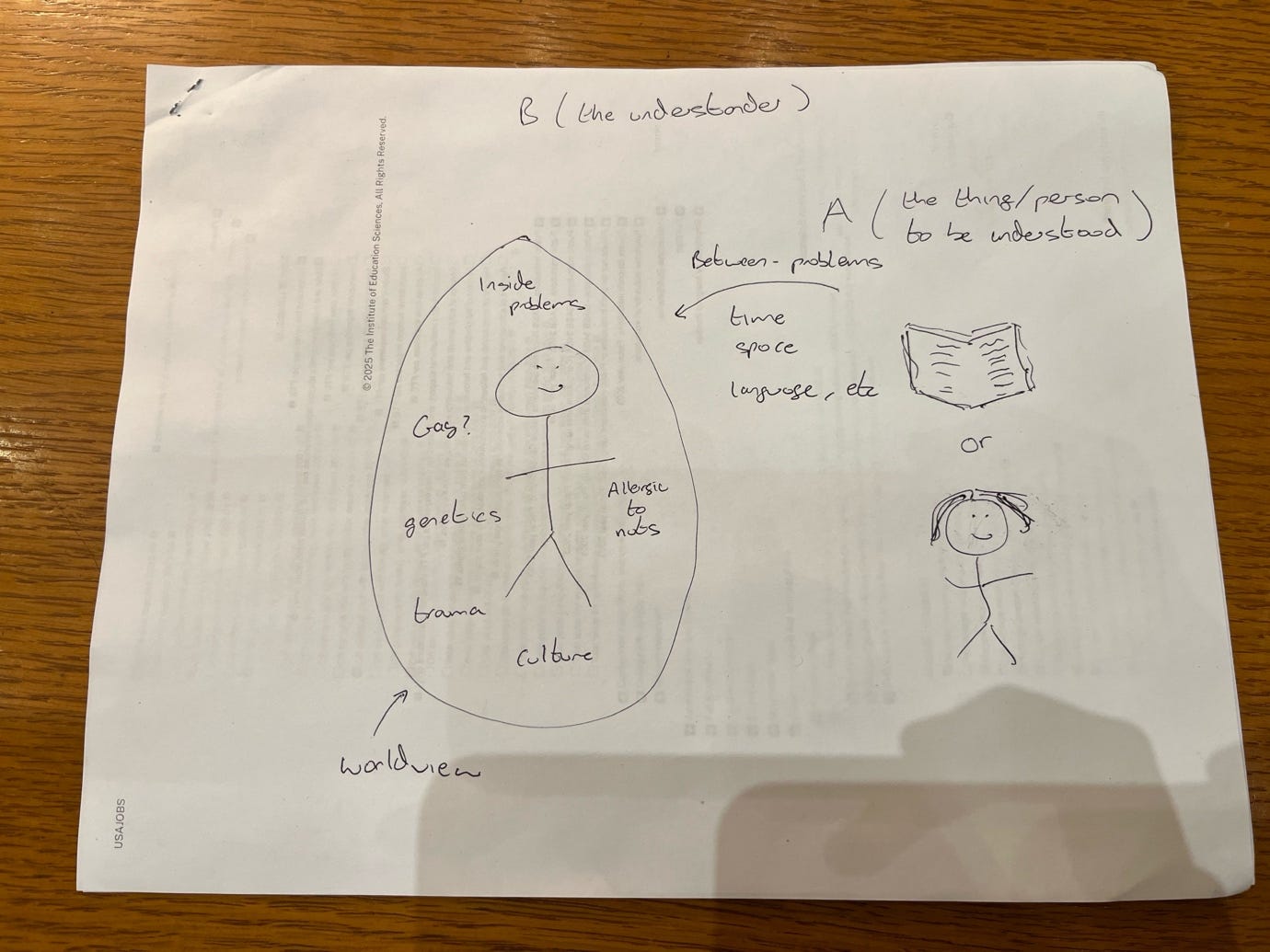In the margins of human error
We may have lost an hour today, but we've gained a very special guest contribution from none other than Thomas Earl!! Enjoy, and don't forget to annotate your books
A Brief Introduction
It’s White Lotus Episode Four Sunday, two weeks to the date since White Lotus Episode Two Sunday, when Tom told me he was working on a piece for the blog. This is something I’ve been asking for for ages, though he claims to have “shattered whatever confidence [he] had to think and write”, a quote excerpted from his five paragraph Goodreads review of Middlemarch. This is to say, Tom is English.
Tom reads what I post with enough care that he quotes it back to me. He still burns the edges of his class assignments for “authenticity”. He listens enthusiastically to the 2010s music you’d hear in a Barnes & Noble Starbucks. I am (selfishly) very lucky that Tom and I’s paths have overlapped, because it makes me feel a little less like I’m shouting into the void. May we all try to find and accept love in the marginal spaces of our lives.
xx,
Yums
FloorTime2000 Guest Contribution
We’re going old school. A FloorTime20042000 takeover.
Shortly after Yumi asked me to write a guest contribution to this blog, I navigated to the FloorTime2004 page to refresh myself on the latest posts. Having remembered that Yumi and Willem were in the middle of writing a larger series on love, I promptly closed my laptop.
A few days later and (for reasons I won’t get into) I had just listened to the soundtrack from the Lady Gaga/Bradley Cooper remake of A Star Is Born. I decided I better try writing. Days of frustration and stagnation followed. What I offer here is an attempt to talk about love in the most English way possible – namely, something that could, perhaps, in some universe, be somehow related to love, obfuscated by a lot of euphemism and stammering.

I’m taking Capitalism, Character, and Community in the Victorian Novel this semester. I joined the class late, so I borrowed the first book for the class from my friend Nelson to catch up while my copy was in the mail. I love Nelson. We exchanged texts that told each other as much on Valentines Day. [I still don’t know why, even when you genuinely wholeheartedly love someone, it’s easier to tell them on text instead of in-person.] But the point is that I borrowed his copy of Wilkie Collins’ The Woman in White and in the process I learned the contents of the novel, but more importantly also something about the contents of Nelson.
I found Nelson’s excessive marginalia distracting and annoying at first. He ad-libs in real time with the narrative, exclaiming “ha!” or “oh!” at moments that he finds amusing or shocking (which is more-or-less every other page). But I found more productive comments. “Dante!!!” was written and triple underlined beside a passage which, without this pointer, I wouldn’t have realized was referencing the poet. And his more specific and thoughtful notesemphasized aspects of the text which (because of his broader reading history, intellect, and degree of thoughtfulness) wouldn’t have stood out to me.
Since you’re all regular readers of Willem’s writing, you’ll be familiar with the concept of hermeneutics. Hermeneutics is (I think) a word for the study of the problem of transmitting understanding from A (which could be a text, say The Woman in White, or a person) to B (which is the person trying to do the understanding). There are many things that might make this transmission difficult. There could be space or time between A and B; A might be written in German, or A might be so old that the meanings of words have changed drastically sincethe time A was written. These are problems that come up more-or-less between A and B.
But problems also arise internal to B. Nelson, because he has read Dante!!!, understoodreferences in The Woman in White better than me. Philosophers have said some pretty interesting things about how our specific worldview influences the understanding we take away from an experience with any given A. And I think that makes a good deal of sense. See helpful diagram:
University teaches us to read until we are learned enough to recognize Dante!!! everywhere we see it. The goal is to become the best B’s we can be – well equipped to squeeze as much understanding as possible out of any given A.
This, it seems to me, is doomed to fail. It might be true that if I actually read any Dante!!! I’dstart to recognize it in places. However, as Professor Nunokawa will tell you, The Woman in White is not actually about Victorian crime at all. It turns out it’s actually about homosexual love. And no matter how many seminars I sit through in which Jeff argues that every Victorian novel is only really about homosexual love, there’s no way I’m going to understand what that means in the same way Nelson will.
That’s because what I have been calling worldview is informed not only by the sum of reading history + intellect + thoughtfulness but also incorporates something like the sum of past breakups + childhood trauma + genetics + stimulant habits + culture and community of origin. The result is that understanding, attempted individually, will always be constrained by a tunnel vision. And that explains why I enjoyed reading The Woman in White with Nelson’s annotations so much. I was not only reading the book but also a little stream of consciousness from Nelson’s mind. I was getting a small glimpse into his understanding of the universe the novel conjured.
It turns out books aren’t the only things we need to try and understand. There are many more important things.
Let’s imagine that A is no longer The Woman in White, but rather a person that we are trying to understand. Perhaps A is a person we think we might love. Let’s call him Willem. If I think I might love Willem, and I want to try to understand him as part of a larger effort to think seriously about whether I love him, I need to roll up my sleeves and tackle two problems:
1) I need to shorten the distance from A and B as much as possible. I need to solve the problems to understanding that arise between A and B.
2) I need to understand how my worldview prefigures my ability to understand what Willem is offering the world. I need to at least try and solve the problems that arise internal to B
The first problem is pretty simple. Willem and I live in the same place at the same time. Except for moments when his impressive cultural repertoire bests me, I pretty much understand the words he uses and the context in which he uses them. When Willem talksabout “Princeton,” for example, the word “Princeton” carries a lot more meaning for him than it would for many other Americans. Happily, though, I understand a good deal of that additional “Princeton” context. This all makes the A to B stuff in the hypothetical love affair between Willem and I relatively manageable.
I find myself very stressed, however, by the second problem. And that stress is exacerbated by the fact that in real relationships, unlike in my English seminar, threesomes aren’t encouraged. Nelson and I can’t date Willem simultaneously. He takes him to dinner before I take him to the movies, then we swap notes, is at best an unfunny suggestion for a Steve Carell rom-com. It’s no way to live. But I know that alone I am not equipped with the skills not the experience to fully understand and appreciate Willem.
And can Willem ever really know or understand me, when I’ve had 24 years of life informing who and what I am that he must disentangle? More than one relationship in my life has failed because of this apparent incompatibility. I’m very touchy about my background so I broach the subject gingerly, drip-feeding morsels of information about where I’m from. I share Sam Fender songs that talk about home explicitly, and books and stories which hint at the relevant themes, observing closely how the other person reacts. Observing whether they get it, or at least whether they are trying. In a small number of cases, I’ve taken people into my home. Driving them around the sleepy towns, to the watering holes and care homes about which my other life revolves, is a way to shrink the distance from A to B as much as possible. Misunderstanding, in these circumstances, can’t exist between the two individuals but must only exist within them. There are no more excuses.
And yet it persists. I find it difficult not to judge (R/r)elationships based on the ability of the other person to comprehend that place and what it has done to me. I acknowledge that this is toxic behavior. Yes, I am seeking therapy. The point is that our worldviews, I believe, have drastic consequences for what it means to say that we “understand” someone. And every day I realize how big (and how dangerous) my blindspots in my ability to understand other peopleare.
My mother (in her traditional ways) tells me that loving should only come after understanding. But I’m not sure that’s true. The thing I have loved most about Princeton is the (many) generations of people I have met who challenge me to work on my blindspots. They surprise me always. I don’t understand them at all. And yet I love them even more for it.




